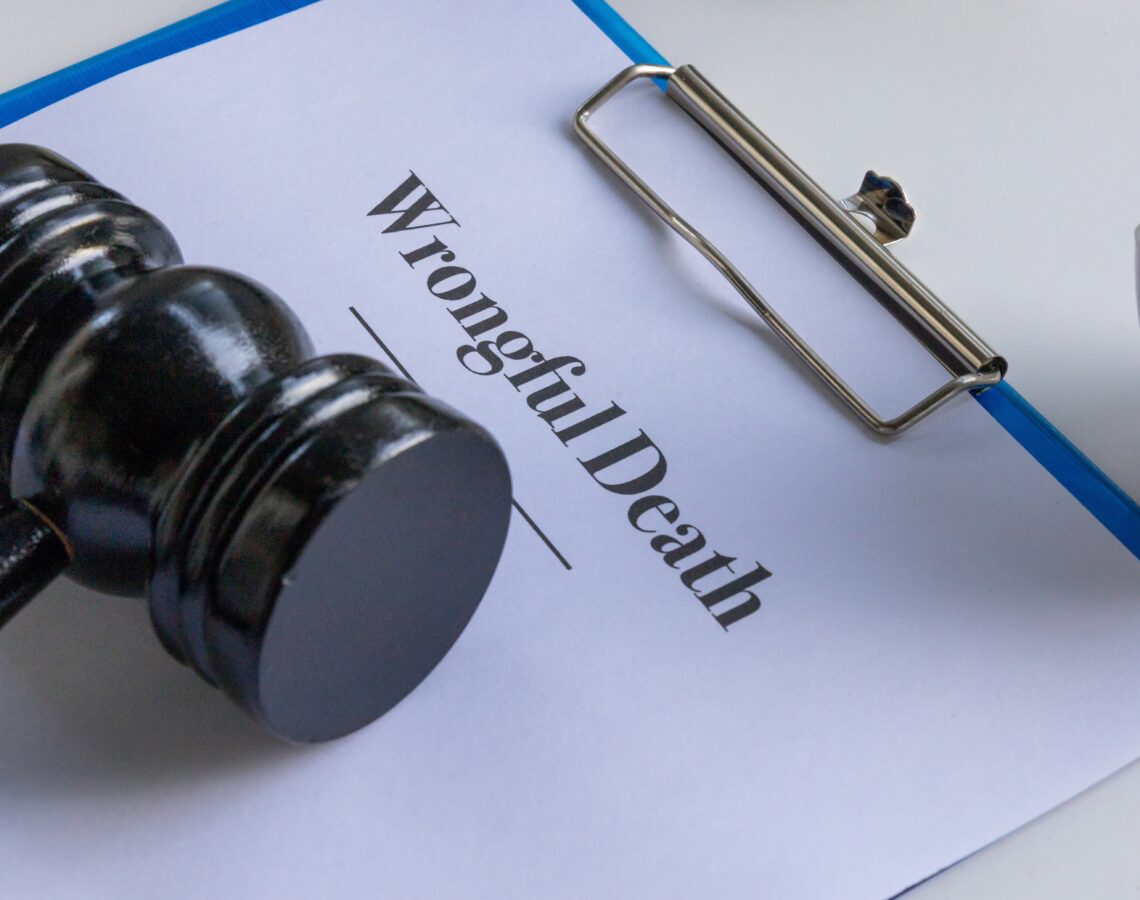Indiana Wrongful Death Laws: What Workers Need to Know

Losing a loved one due to a workplace accident or job-related illness is a profound tragedy that leaves families grappling with grief and uncertainty. Surviving family members need to understand Indiana’s wrongful death laws to seek justice and financial stability. These laws provide a legal pathway to hold responsible parties accountable and secure compensation for the loss endured.
If a loved one died due to a work-related accident or illness, consult a knowledgeable Indiana wrongful death attorney near you who can offer guidance tailored to your situation.
Schedule a Free Initial Consultation Today!
Workplace Fatalities: The Numbers
Fatal workplace incidents affect families across the country and throughout Indiana. These tragedies leave a permanent mark on loved ones and often reveal preventable safety failures that never should have occurred.
 National Statistics
National Statistics
According to the U.S. Bureau of Labor Statistics (BLS), 5,283 workers died from work-related injuries in the United States in 2023, marking a 3.7% decrease from the 5,486 fatalities reported in 2022. That equates to one worker dying every 99 minutes due to a work-related accident.
Indiana-Specific Statistics
In Indiana, the most recent BLS Census of Fatal Occupational Injuries (CFOI) data shows 146 work-related deaths occurred in 2022. While this number decreased slightly from the 158 fatalities reported in 2021, it still represents a serious concern across the state’s major industries.
Even with federal and state safety regulations in place, many of these deaths stem from preventable hazards—like poorly maintained equipment, inadequate training, and unsafe working conditions. Surviving family members often want answers, justice, and compensation to carry on after the loss of a loved one. Indiana’s wrongful death laws offer a legal path forward in many of these cases.
Understanding Indiana’s Wrongful Death Statutes
In Indiana, wrongful death refers to a death resulting from the wrongful act or omission of another party. The state’s General Wrongful Death Statute, codified under Indiana Code § 34-23-1-1, allows the personal representative of the deceased’s estate to pursue legal action against those responsible. This statute encompasses various scenarios, including workplace fatalities, providing a legal avenue for families to seek compensation.
Workers’ Compensation vs. Wrongful Death Claims
Workers’ compensation in Indiana offers death benefits to dependents of workers who suffer fatal injuries on the job. These benefits typically cover medical expenses and a portion of lost wages.
However, there are circumstances where a wrongful death claim can be filed in addition to workers’ compensation benefits, particularly when a third party’s negligence contributed to the fatality. Unlike workers’ compensation, wrongful death claims can address non-economic damages, such as loss of companionship, and may involve different liability standards.
Who Can File a Wrongful Death Claim in Indiana?
After a fatal workplace accident, one of the first legal questions families often ask is: Who has the legal right to file a wrongful death claim? Indiana law sets clear rules about who may bring this type of lawsuit, and those rules can differ based on the age, marital status, and dependents of the deceased.
Personal Representative Requirement
In Indiana, a wrongful death claim must be filed by the personal representative of the deceased person’s estate. This individual—sometimes called an executor or administrator—is usually appointed by a probate court and may be named in the deceased’s will or selected by the family.
The personal representative doesn’t always keep the proceeds of the claim. Instead, they bring the case on behalf of the eligible surviving family members and ensure that any compensation is distributed according to Indiana’s wrongful death statutes.
Eligible Beneficiaries Under Indiana Law
While the personal representative files the claim, the surviving beneficiaries are the ones who may receive the compensation. Eligible beneficiaries depend on the identity and family situation of the deceased:
- For adults with a surviving spouse or dependent children, the spouse and children are generally entitled to recover damages.
- For children under the age of 20 (or under 23 if enrolled in college or vocational school), the parents or legal guardians can file a claim.
- For unmarried adults without dependents, the situation becomes more limited. Parents may be entitled to bring a claim and recover damages, but non-dependent adult children or distant relatives typically are not eligible beneficiaries under Indiana law.
In all cases, the court will review the relationships between the deceased and the family members to determine how any awarded damages should be divided.
Special Considerations for Dependents
Workplace-related wrongful death claims often involve situations where the deceased was the primary breadwinner. In these cases, dependent spouses, children, or even elderly parents may rely heavily on the deceased’s income and support.
Indiana courts consider this financial dependency when evaluating the damages available to each family member. For example, a surviving spouse with minor children in Muncie may receive compensation not only for the loss of income but also for the future loss of parental guidance and household services that the deceased would have provided.
In rare cases, a non-family member who can demonstrate financial dependency on the deceased may also be considered during the damages phase. These situations usually require additional documentation and legal review.
Types of Damages Available
Compensation in wrongful death cases can be categorized into economic and non-economic damages.
Economic damages encompass quantifiable financial losses, such as:
- Medical expenses incurred prior to death
- Funeral and burial costs
- Loss of the deceased’s expected earnings
Non-economic damages address intangible losses like:
- Loss of companionship and emotional support
- Mental anguish
- Loss of consortium
- Loss of parental guidance
Indiana imposes caps on certain damages, particularly in cases involving unmarried adults without dependents, where non-economic damages are limited to $300,000.
Statute of Limitations

In Indiana, wrongful death claims must be filed within two years from the date of the deceased’s death. Failing to file within this period can result in the loss of the right to pursue compensation.
Exceptions to this statute may exist, such as cases involving minors or instances where the cause of death was not immediately known. Additionally, claims against government entities may have shorter notice requirements, necessitating prompt legal consultation to ensure compliance with all deadlines.
Third-Party Liability in Workplace Deaths
While employers are generally protected by workers’ compensation immunity, there are situations where third-party liability arises. For example, if defective equipment manufactured by a separate company contributed to the fatality, the manufacturer could be held liable.
Similarly, contractors or subcontractors whose negligence led to the incident may also be pursued through wrongful death claims. Identifying all responsible parties is essential to ensure that the family receives full and fair compensation.
Steps to Take Following a Workplace Death
In the aftermath of a workplace death, family members should consider the following steps:
- Seek Immediate Support: Connect with support networks, including family, friends, and counseling services, to navigate the emotional challenges ahead.
- Preserve Documentation: Collect all relevant documents, such as employment records, incident reports, and correspondence with the employer or insurance companies.
- Consult Legal Counsel: Engage with an attorney experienced in wrongful death and workers’ compensation cases to evaluate potential claims and guide you through the legal process.
- Cooperate with Investigations: Work alongside investigators to establish the facts surrounding the incident, which is crucial for any legal proceedings.
Common Challenges in Workplace Wrongful Death Cases
Even with solid evidence, wrongful death cases in workplace settings often involve pushback. Employers may deny fault or argue that the incident was an unavoidable accident. Insurance companies may attempt to shift blame to the deceased or reduce the payout by underestimating the value of future lost earnings.
In dual claim scenarios—where both workers’ compensation and wrongful death claims are pursued—insurance adjusters may try to use statements from one claim to limit the other.
That’s why you need an attorney to align both claims under a consistent legal strategy.
In more complex industrial settings, such as a refinery in Whiting or a logistics hub near Indianapolis, multiple contractors and vendors may be involved. Identifying which party holds legal liability requires a deep dive into contracts, work logs, and safety protocols. This can affect who gets named in a wrongful death lawsuit and how damages are recovered.
How an Attorney Can Help
Families dealing with the sudden loss of a loved one after a workplace accident often find themselves dealing with more than just grief. Insurance companies may pressure them into accepting low settlements. Employers or third-party contractors may deny liability or attempt to shift blame.
An attorney who handles wrongful death and workers’ compensation claims in Indiana can take the legal burden off your shoulders. From the first phone call, a lawyer can guide your family through every step—gathering evidence, filing the appropriate claims, and dealing directly with insurers and opposing parties
Managing Multiple Legal Avenues
In Indiana, families may have several overlapping options after a workplace fatality. A workers’ compensation claim can help cover certain expenses and offer some financial support. However, if a third party—like a subcontractor, property owner, or equipment manufacturer—played a role in the death, a wrongful death lawsuit may be appropriate as well.
An attorney can determine which parties hold legal responsibility and whether multiple claims should be filed. They coordinate all actions to avoid inconsistencies, delays, or missed deadlines, ensuring that your family’s legal rights are protected at every stage.
Preserving Evidence and Building a Strong Case
Workplace wrongful death claims often rely on technical evidence—such as accident reports, OSHA violations, surveillance footage, maintenance logs, or witness statements. In high-risk job sites like a construction zone in Bloomington or a warehouse in Plainfield, this evidence may be controlled by the employer or lost over time.
Attorneys move quickly to preserve key documents, obtain records, and secure expert testimony when necessary. They work with investigators, medical professionals, and safety consultants to build a clear and persuasive case that holds up during settlement negotiations or in court.
Valuing the Full Extent of Your Loss
Indiana law limits some types of non-economic damages in wrongful death cases, but there’s still a wide range of compensation that may be available. Attorneys calculate the full financial value of your loved one’s contributions—lost wages, health benefits, retirement savings, and more. They also consider funeral expenses, medical bills, and other losses that the family shouldn’t be left to shoulder alone.
In cases involving minor children or surviving spouses, attorneys may pursue compensation for the loss of care, guidance, and support—losses that insurance companies often overlook or undervalue.
Holding Responsible Parties Accountable
When employers try to avoid responsibility or insurance companies delay or deny legitimate claims, attorneys hold them accountable. They push for fair outcomes and challenge weak or unfounded defenses. If a third party refuses to negotiate in good faith, your legal team can prepare for trial and present your case to a judge or jury.
Attorneys understand how to leverage Indiana’s wrongful death statutes to your family’s benefit and how to position the case for the strongest possible outcome—whether that happens through a negotiated settlement or in court.
Contact Our Experienced Indiana Workers’ Comp Lawyers Today

At Klezmer Maudlin, PC, we understand what families go through after a workplace tragedy. Our legal team has decades of experience representing injured workers and the families of those killed on the job throughout Indiana. Whether your loved one worked in Terre Haute, Anderson, Lafayette, or any other Indiana city, our Indiana personal injury attorneys stand ready to help.
We know how to deal with workers’ compensation boards, insurance carriers, and third-party defendants, and we do it all while keeping your needs at the center. You don’t need to manage paperwork, deadlines, or negotiations alone. We’ll handle the legal work so you can focus on your family.
If you lost a family member due to a workplace accident or occupational illness, don’t wait to get the answers and support you deserve. Contact Klezmer Maudlin, PC today for a free consultation and learn how we can help you pursue justice and financial recovery.

